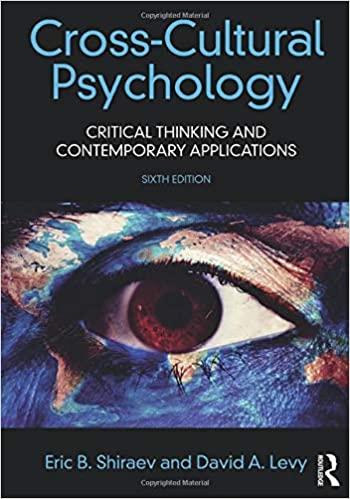Question
A high school physics teacher wondered if his students in the senior class this year will be more likely to go into STEM (Science, Technology,
A high school physics teacher wondered if his students in the senior class this year will be more likely to go into STEM (Science, Technology, Engineering, Mathematics) majors than Social Science and Liberal Arts majors. He asked each of his 72 students about their first choice for major on their college applications and conducted a Chi-square test for goodness of fit with an alpha level of .05 to see if the number of students choosing each category differs significantly.
- 20 - STEM
- 18 - Social Sciences
- 34 - Liberal Arts
Calculate theX2statistic. Select the correct answer (your answer may vary just slightly due to rounding differences, in which case just select the answer closest to yours).
a. X2 = [(OF-EF)2/EF] =5.01
b. X2 = [(OF-EF)2/EF] =6.33
c. X2 = [(OF-EF)2/EF] =4.16
d. X2 = [(OF-EF)2/EF] =4.01
Calculate the degree of freedom and then identify the critical value.
a.df = number of levels-1 = 4-1 = 3
The critical X2 value for an alpha of .05 with a df of 3 is 5.992
b. df = number of levels-1 = 3-1 = 2
The critical X2 value for an alpha of .05 with a df of 2 is 5.783
c. df = number of levels-1 = 3-1 = 2
The critical X2 value for an alpha of .05 with a df of 2 is 5.992
d. df = number of levels-1 = 4-1 = 3
The critical X2 value for an alpha of .05 with a df of 3 is 5.783
Select the correct comparison of the X2statistic with the critical value and the subsequent correct decision regarding the null hypothesis.
a. The critical value is more than theX2 statistic, so the teacher can reject the null hypothesis.
b. The X2 statistic is less extreme than the critical value, so the teacher fails to reject the null hypothesis.
c. The X2 statistic is less extreme than the critical value, so the teacher can reject the null hypothesis.
d. The X2 statistic is more extreme than the critical value, so the teacher can reject the null hypothesis.
Select the correct conclusion to the research question.
a. The types of college majors are equally popular.
b. The types of college majors are not equally popular.
Step by Step Solution
There are 3 Steps involved in it
Step: 1

Get Instant Access to Expert-Tailored Solutions
See step-by-step solutions with expert insights and AI powered tools for academic success
Step: 2

Step: 3

Ace Your Homework with AI
Get the answers you need in no time with our AI-driven, step-by-step assistance
Get Started


